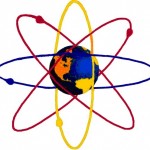All English posts
Nice (France), Energy and Geopolitics Forum.
2 Dec 2012CENTRE INTERNATIONAL DE FORMATION EUROPEENNE
CLUB DE NICE
Énergie et Géopolitique
Nice, December 3rd, 4th, 5th, 2012
Energy in Europe and in the world
Round tables
– The energetic systems : crisis or mutation?
– The Arctic
– The Eastern Mediterranean area
– The Shale gas
Greenpeace has criticised Poland hosting the UN climate summit in 2013, as announced at the UN Framework Convention on Climate Change in Doha, Qatar. “A host country should be firmly committed to climate protection and be able to negotiate compromises and seal deals, but Poland has a bad track record on both counts,” says Greenpeace’s Jiri Jerabek. 
Ministers and NGOs are at the 18th Global climate change conference, which opened in Qatar on November 26th, with representatives from nearly 200 nations convening for two weeks of talks aimed at curbing global carbon emissions.
Poland has been slammed for its record on environmental issues after it blocked raising EU carbon emission targets and its decision to go ahead with shale gas extraction and building a nuclear power station.
“We have experience organizing the 2008 Conference of Parties and heading the European Union delegation at the previous climate summit,” Polish environment minister Marcin Korolec said in a message sent to the Bloomberg news agency. “We know how to grow and cut emissions. All ingredients are there for a good negotiation session.”
“We are sending a clear signal that the main priority of climate policy should be the signing of a global deal,” Korolec added. “Europe will only be able to lead the process if we manage to convince our partners to join.”
Poland hosted the UN climate summit in 2008 when 10,000 delegates attended the conference in Poznan.
Source: Polish Radio and Bloomberg
Poland, Lithuania, Russia: Respect for the dead!
30 Nov 2012Lithuanian police have arrested five people after a tomb containing the heart of Polish national hero Jozef Pilsudski was vandalised in Vilnius on November 24th. The bunch of thugs also draped a banner with the words “Poles die” and left a box with “attention bomb” and “TNT” written on it. 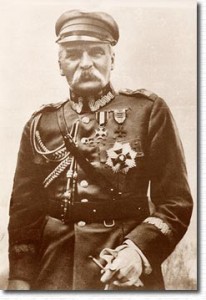
The Polish ambassador in Vilnius, Janusz Skolimowski said he has received assurances that security will be stepped up at the Rossa Cemetery. Pilsudski was born in Zulow near Vilnius, then part of the Russian empire, in 1887. After his death in 1935 his body was buried in Krakow, while his heart was taken to Vilnius.
At the same time, the Vremya news magazine on Russian Channel One reported that in 1953, when Polish authorities decided to dig up the remains of Russian soldiers who died fighting Nazi German forces in Kostrzyn nad Odra in western Poland, so as to re-bury them in large cemeteries around the country, they did so by only partially removing all the body parts.
Last October a research dig found that 102 out of 110 bodies had been re-buried with their skulls or other parts missing.
The Russian news programme claimed the “barbaric” exhumations showed a “monstrous lack of respect for the dead” and reported that Russian authorities had called on Poland to give a full explanation as to why the bodies of “soldiers who liberated Poland from Nazi Germany” were shown so little respect.
“Standards in 1953 differed significantly from those of today,” Adam Siwek from Poland’s state-backed Council for the Protection of Struggle and Martyrdom has already answered.
Source: Polish Radio
Poland, Aftermath. A new Jewish pogrom film.
13 Nov 2012“I am very happy that such a film was made in Poland” veteran director Andrzej Wajda said after the film’s press premiere in Warsaw.
Minister of Culture Bogdan Zdrojewski highlighted that: “I admire the courage in taking up such a difficult theme and analyzing, in a cinematic form, a dramatic episode in Poland’s history”. 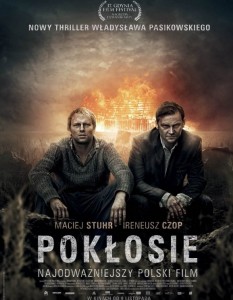
Aftermath is a Polish-Dutch-Slovak-Russian co-production.The cast includes several top Polish actors – Maciej Stuhr, Zbigniew Zamachowski and Jerzy Radziwiłowicz.
Inspired by the 1942 tragedy in which hundreds of Jews were burned alive in a barn, an event long blamed on Nazi Germany, “Poklosie” (“Aftermath”) was directed by Wladyslaw Pasikowski.
“I wanted to tell a story that would interest a broad number of Poles because it is one of the most painful parts of our country’s history,” Pasikowski explained. “We already have a huge number of films on the horrors committed by the Soviets and the Germans, and it’s time to say what bad things we did ourselves.”
The director was inspired by “Neighbours”, a book by Polish-origin US historian Jan Tomasz Gross, which sent shock-waves across Poland after his publication in 2000. The date of the massacre in the village of Jedwabne, some 190 kilometres northeast of Warsaw, has entered Poland’s remembrance calendar.
“This museum is an eloquent declaration of the principles of tolerance toward people and their freedom,” said at the inauguration Israeli President Shimon Peres, 89, who was born in what is now Belarus before his family settled in Palestine in the 1930s. Peres recalled that both his parents had been born in the Russian Empire and everyone at home spoke “Yiddish, Hebrew and Russian”, while his mother had sung him Russian songs. “Here we can see man part with the past and move into the future with hope.” “The museum tells us about two ideologies – communism and Zionism,” he added. 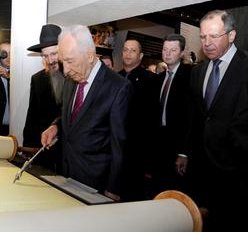
President Vladimir Putin hoped the new museum would become “a place for dialogue and agreement between peoples,” said a statement read at the ceremony by Lavrov. “Any attempt to review the contribution of our country to WWII victory or to deny the Holocaust is not just a cynical lie but a forgetting of history,” Putin’s statement added.
The idea of establishing the museum came from the Federation of Jewish Communities of Russia, which was given the museum building in 2001. Grafts’ renovation and expansion of the 1927 Konstantin Melnikov’s bus depot have transformed the space into the world’s largest Jewish museum. The museum occupies over 8,500 square meters on the Moscow Bakhmetyevsky Garage which was formerly an art gallery run by socialite Dasha Zhukova.
The museum aims to demonstrate Jewish cultural traditions and customs and also show the history of Russia through the prism of one ethnic group, organizers say.
Like its ‘twins’ in New York, Paris and Berlin, the Moscow museum highlights historic Jewish documents, photographs and letters spanning a period of more over two centuries.
Jews were repressed in Tsarist times when starting in the late 18th century they were largely forced to live in an area of the western Russian empire known as the “Pale” where many lived in impoverished towns known as shtetls.
Hitler‘s armies in World War II then occupied most of today’s Belarus, Ukraine as well as western Russia, leaving Soviet Jews exposed to the full brunt of the Nazi killing regime.Heavily targeted during the 1930s purges, Jews suffered even after World War II in the USSR under Stalin’s rule, especially when the purported discovery of a so-called “doctors’ plot” against him unleashed a wave on anti-Semitic hysteria.
Nonetheless Jews have over centuries made a huge contribution to Russian culture, ranging from the writer Sholem Aleichem, the Vitebsk-born artist Marc Chagall or the poet Osip Mandelstam who died in the Stalin camps.
Sources: Ria Novosti, EJR.
Russia and the whole Eastern Europe are observing the last days of the US presidential campaign with great interest. Barack Obama and his challenger, Mitt Romney, represent an opposite approach to the problems of the region.
In 2009 the now outgoing president launched the “reset” policy in order to restore the relationship with the Kremlin after the war in Georgia. During his campaign the candidate of the Republicans has promoted Russia to “number 1 geostrategic foe of the United States”. 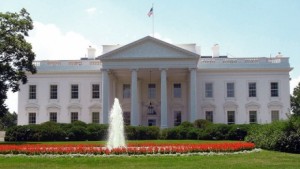
So, the question is: if Romney wins, will Europe come back to the Cold War epoch?
The answer is negative. First of all, even if Russia is considered a “resurgent” power by the experts it has finally lost the status of superpower held by the Soviet Union until 1991. At the moment, it has a more limited weight in the world’s political, economic, and military affairs.
Moscow is no more a hated enemy, as it was for four decades in the 20th century. It is a useful ally in places like Afghanistan, but also a partner, who has often criticized the Western positions on issues like Syria or Iran, and an energy supplier to the US strategic reserves.
In short, Russia is not a threat for Washington or the European Union as it was the Soviet Union. Today’s challenges in the era of the globalization are completely different from those of the past.
Mitt Romney killed two birds with one stone. He used that old fashioned definition, because he simply wanted to attack Obama and its foreign policy, not Russia, that remains – anyway in elderly American people mind – an adversary.
Barack Obama promised the Russians to be more “flexible” after the elections. In 2009 he started a new period in the bilateral relationship, but he did not invite Moscow to join from inside the regional anti-missile Shield in the future controlling Headquarters.
That would represent the decisive recognition of the successful end of the Russian democratic evolution which began in 1991. Former Kremlin’s European satellites, now US allies, are still hesitant to make that historic step. Protests in Moscow and the repression of the dissent will further delay any other openings.
Nonetheless, in these four years there have been positive changes in the US-Russian relationship. Moscow and Washington signed the nuclear arms control treaty in 2010 and this year the White House has supported Russia’s accession to the World Trade Organization.
Vladimir Putin has recently described Barack Obama as “a genuine person” who “really wants to change much for the better”. The Russian leadership, including Dmitry Medvedev, has good personal relationship with him and, if it were able to vote the Kremlin would choose Obama.
But if Romney is elected president it will not be a catastrophe. From the internal political perspective Romney’s victory would guarantee president Putin a useful adversary determined to subvert the state of rule in the Motherland and former USSR. And it would be easier to justify the astronomically expensive 10-year rearmament plan for the armed forces ($770 billion), especially now when the economic crisis is narrowing and social problems are becoming more serious every day.
Giuseppe D’Amato
Ukraine, a transparent vote?
27 Oct 2012 The parliamentary election in Ukraine will be “transparent and democratic,” President Victor Yanukovych has said. Following an example from Russia, Ukraine has installed webcams in all polling stations for maximal transparency.
The Organization for Security and Co-operation in Europe (OSCE) has sent 635 election observers to the country – more than ever before. In total, some 3,800 foreign observers monitor the vote. But only 8.8 percent of Ukrainians say the ballot will be fair, according to the Kiev-based Democratic Initiative Fund. 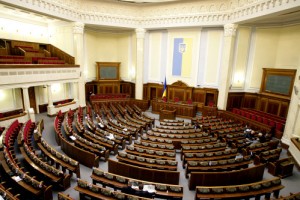
“The significant lack of political pluralism on television is very worrisome and requires immediate action,” EU foreign policy chief Catherine Ashton highlighted in a statement. The elections “will be a litmus test of Ukraine’s democratic credentials.”
The last time that Ukraine had a mixed election system – electing half of its 450 members of parliament in geographic districts, the other half through party lists – was 2002. Ten years ago, the opposition did well on the party lists, but failed to muster a majority after doing poorly in the single-mandate districts. Experts think that history will repeat itself.
The parliamentary vote marks the halfway point in Yanukovych’s first presidential term. Yanukovych’s approval rating is 12.6 percent, down from 37.8 percent in 2010, according to the Razumkov Center for Economic and Political Studies.
Polls suggest his party, the Party of Regions, will preserve its hold on the 450-seat legislature. The Party of Regions has 23.3 percent backing, compared with 16 percent for world boxing champion Vitaly Klitschko’s UDAR, 15.1 percent for Tymoshenko’s Fatherland and 10.1 percent for the Communists.
Control of Parliament will also be a major factor in the higher-stakes presidential contest in 2015. Vitali Klitschko the leader of the opposition UDAR party, seems to be a new future candidate with good chances to win.
Andriy Shevchenko, 36, a former AC Milan striker, runs for Ukraine Forward, which aims to pass parliament’s 5 percent entry barrier. That’s hurting opposition united under jailed ex-Prime Minister Yulia Tymoshenko and improving the prospects of Party of Regions.
The country has become increasingly isolated since Yanukovich’s election in a runoff with Tymoshenko in 2010. And financial analysts say that the country’s economy is in trouble again as a result of flagging demand in Europe, particularly for steel, Ukraine’s main export.
The Georgian parliament approved the new government of Georgia, led by Prime Minister Bidzina Ivanishvili.
This is its composition:
Defense Minister and Deputy Prime Minister – Irakli Alasania
Energy Minister and Deputy Prime Minister Kakha Kaladze 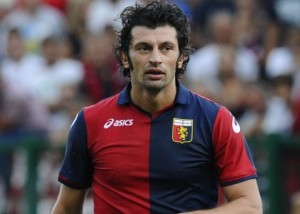
Minister of Finance – Nodar Khaduri
Interior Minister – Irakli Garibashvili
Minister of Justice – Thea Tsulukiani
Minister of Foreign Affairs – Maya Panjikidze
Minister for Reintegration – Paata Zakareishvili
Minister for Infrastructure and Regional Government – David Narmania
Economy Minister – Giorgi Kvirikashvili
Minister of Labour, Health and Social Affairs – David Sergeenko
Minister of Environment – Khatuna Gogaladze
Minister of Education and Science – Giorgi Margvelashvili
Minister of Refugees and Accommodation – David Darakhvelidze
Minister of Youth and Sports – Levan Kipiani
Minister of Penitentiary – Sozar Subari
Culture Minister – Guram Odisharia
Agriculture Minister – David Kirvalidze
State Minister for Diaspora Affairs – Kote Surguladze
State Minister for European Integration – Alexi Petriashvili.
Minister for Employment – Kakha Sakandelidze
Talks about constitutional changes have already started in the new parliament. “In order to avoid one party government, it is already necessary to make changes in the relevant part of the constitution and create applicable government model. However, we will make these changes after public discussions. We will try hard to take into account all sensible proposals and interests. The constitution will establish the model that will guarantee stability of the state,” said Prime Minister Ivanishvili. The new Constitution will give political opposition mechanisms for controlling government activities.
Under current legislation the change in the Constitution can be made if 2/3 of lawmakers (100 MPs) vote for it. Ruling Georgian Dream currently has 85 seats, while the opposition United national Movement – 65 mandates.
The main goal of the new government will be de-occupation of Georgia. “At the same time, we will look for the ways of talking to Abkhazians and Ossetians. With the support of international society we will manage to start negotiations with Russia about economic and cultural affairs,” said Ivanishvili. The territorial integrity of the country is vital for the government to be effective. Important steps will be taken towards integration with the EU and NATO.
On October 9th at 2 p.m. meeting in support of Radio Liberty at the US embassy in Moscow. On October 10th journalists.

—
To the International Committee of the U.S. Congress
U.S. Secretary of State Hillary Clinton
Senator Benjamin Cardin
September 27, 2012
Dear Mr. Cardin, dear Ms. Clinton
We deeply regret to officially announce that following the decision of the management Radio Liberty stops its medium- wave broadcasts.
It has been done at the moment, when the regime of Vladimir Putin launched a new attack on the freedom of speech and Democratic movements in Russia. Human rights organizations are declared “foreign agents”, USAID stops its work in Russia.
Radio Liberty has existed for more than 60 years and for the whole generations of 1960- 80th was a source of accurate information. Current situation in Russia looks more and more like USSR. Current domestic and foreign policy is determined by people, who came from KGB and it is becoming clear, that we cannot lose the traditions of the station, which has always been taking very active civil position based on the universal values of freedom, democracy and human rights. In today’s Russia all these values are being attacked by the government.
Reorganization of Radio Liberty work was carried out in a form of shameful and abusive for its employees “special operation”. Any KGB could not harm the image of the radio and the United States in Russia as did US managers- the President of the Radio Liberty Steven Korn and the vice- president Julia Ragona.
They have ignored BBG’s (Broadcasting Board of Governors) findings confirming the effective work of the Russian service of Radio Liberty (http://www.bbg.gov/wp-content/media/2012/02/FY-2013-BBG-Congressional-Budget-Request-FINAL-2-9-12-Small.pdf). A team of journalists, who used to create radio and internet content, a team that used to bring hundreds of thousands of spectators of democratic rallies broadcasts in 2011-2012 is dismissed.
Mr. Korn and Ms. Ragona’s staffing solutions were conducted without even slightest consideration of the creative contribution and potential of each employee. Dismissed are the professionals with stainless reputations. Some of the journalists have left Moscow office of Radio Liberty deliberately on moral grounds.
Additionally a new head of the Russian service is assigned a person, who received negative assessment as a manager at her previous jobs. A person never previously engaged in a kind of work offered by the Radio Liberty.
Mass dismissals of journalists have disorganized the work of the broadcast and the work of the radio’s website for extended period.
Scandalous publication about the activities of American management team of the radio appeared in Russian and foreign press. The managers themselves could not explain their decisions to the Russian society. These decisions look very strange, while the financing of the Russian service for years 2012- 2013 has not been reduced, but in fact even increased.
From now on, every time Russian authorities will decide to close one or another independent media, they will refer to for them very convenient “experience” of the management of Radio Liberty.
We do not have any information about a new concept of multimedia portal that was proposed instead of public over- the –air and internet broadcasting and we are concerned that this new concept might be contradictory to the goals and missions established by the U.S Congress and BBG and to the goals and missions of Radio Liberty in Russia.
We ask the Congress to set up a special commission to investigate the activities of the Radio Liberty’s management, which caused such damage to the image of the United States in Russia and review the decisions that have been made.
With kind regards,
Lyudmila Alekseeva, Chairwoman of the Moscow Helsinki Group
Sergei Kovalyov, Chairman of the Russian “Memorial”, the chairman of the Public Commission for the Preservation of the Heritage of Academician Sakharov — Andrei Sakharov Foundation
Vladimir Bukovsky, Writer, a former political prisoner in the Soviet Union
Tatiana Yankelevich, Center Associate, Davis Center for Russian and Eurasian Studies Harvard University, Cambridge, MA, daughter of Elena Bonner and Andrei Sakharov
Pavel Litvinov, a former political prisoner in the Soviet Union
Alexei Simonov, the President of the Glasnost Defense Foundation
Lev Ponomarev, Executive Director of the Russian movement “For Human Rights”
—
What happened at Radio Liberty in Russia. Elena Rykovtseva in Novaya Gazeta.
Vladimir Putin turns 60. His numbers.
7 Oct 20121 — The number of rare tiger cubs Putin was given on his birthday in 2008. He declined to reveal who gave him the cubs. But Putin Chechen leader Ramzan Kadyrov, a Putin appointee, is known to be the proud owner of a pet tiger.
2.6 — The price in U.S. dollars of a barrel of oil in 1952, the year Putin was born in Leningrad.
6 — The number of years that have passed since Journalist Anna Politkovskaya was shot dead outside her apartment in Moscow on October 7, 2006, Putin’s 54th birthday.
11 — Putin’s age when he began learning sambo and judo. He holds a black belt in the latter. 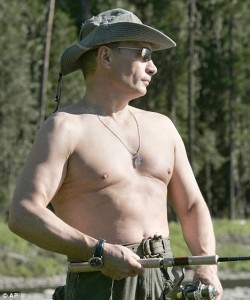
12 — The number of female Moscow State University students who posed in lingerie to mark Putin’s 58th birthday in 2010 in a racy calendar.
16 — The number of years Putin served in the KGB. Five of these Putin worked in Dresden in East Germany. In 1991, he officially retired from the KGB as a lieutenant colonel and became deputy mayor of St. Petersburg, serving under his old law professor Anatoly Sobchak.
20 — The number of palaces, dachas, and country retreats at Putin’s disposal, according to a report drafted by opposition figure Boris Nemtsov. The report, released earlier this year, is ironically titled “The Life of a Galley Slave,” in reference to a phrase Putin once used to describe his life as president.
26.1 — The price in U.S. dollars of a barrel of oil in December 1999 when Putin became Russia’s acting president after Boris Yeltsin’s resignation.
29 — The age of Alina Kabayeva, one of Russia’s most successful rhythmic gymnasts, now a State Duma deputy for United Russia. Russian media has reported on widespread — and unconfirmed — rumors that Kabayeva is Putin’s mistress.
54 – The age of Lyudmila Putina, Putin’s estranged wife.
58 — The number of airplanes and helicopters at President Putin’s disposal, according to Nemtsov’s “Life of a Galley Slave” report.
87.9 — The price in U.S. dollars of a barrel of oil on the eve of Putin’s 60th birthday.
140 — The number of characters used in an impromptu Twitter flash mob last year to mark Putin’s 59th birthday, in which the opposition popularized the “Thank Putin for That” hashtag (#CпасибоПутинуЗаЭто). It was followed by a stream of ironic jibes at the president.
1600 — The time on October 7 that the opposition plans to announce the winner of the most “creative” birthday present for the president. The voting will take place via Facebook on a page called “Let’s Help An Old Man Retire.” It is being organized by Rosagit, a group affiliated with anticorruption blogger Aleksei Navalny.
2002 — The year Putin received for his birthday a dog that could bark “Vova” — the diminutive and affectionate form of his first name, Vladimir.
2,370 — Russia’s average monthly salary in rubles when Putin came to power.
4,230 — The number of days that Putin will still be in the Kremlin if he successfully serves two more terms, until May 7, 2024. He would be 72 years old.
20,702 — The average Russian salary in rubles in 2011, according to Rosstat.
120,000 — Putin’s official salary in dollars.
141.9 million — Russia’s current population. Russia has been in the grips of a demographic crisis spurred by its low male life expectancy and low birth rate, although there is evidence that Russia is beginning to reverse these trends.
146.3 million – The Russian population when Putin came to power.
260 billion — Russia’s GDP in U.S. dollars when Putin first came to power.
1.86 trillion – Russia’s GDP in U.S. dollars in 2011.
RFE/RL correspondent Tom Balmforth
Source: Radio Free Europe/Radio Liberty
Welcome
We are a group of long experienced European journalists and intellectuals interested in international politics and culture. We would like to exchange our opinion on new Europe and Russia.
Categories
- Breaking News (11)
- CIS (129)
- Climate (2)
- Energy&Economy (115)
- EU Eastern Dimension (85)
- Euro 2012 – Sochi 2014 – World Cup 2018, Sport (43)
- Euro-Integration (135)
- History Culture (198)
- International Policy (261)
- Military (74)
- Interviews (18)
- Italy – Italia – Suisse (47)
- Odd Enough (10)
- Poland and Baltic States (126)
- Religion (31)
- Russia (421)
- Survey (4)
- Turning points (4)
- Ukraine (176)
- Российские страницы (113)
Archives
- November 2020
- October 2020
- September 2020
- August 2020
- July 2020
- May 2020
- April 2020
- March 2020
- January 2020
- December 2019
- November 2019
- October 2019
- September 2019
- August 2019
- July 2019
- June 2019
- May 2019
- April 2019
- March 2019
- February 2019
- December 2018
- November 2018
- October 2018
- September 2018
- August 2018
- July 2018
- June 2018
- May 2018
- April 2018
- March 2018
- February 2018
- January 2018
- December 2017
- November 2017
- October 2017
- September 2017
- August 2017
- July 2017
- May 2017
- March 2017
- January 2017
- December 2016
- November 2016
- October 2016
- September 2016
- July 2016
- June 2016
- May 2016
- April 2016
- February 2016
- January 2016
- November 2015
- October 2015
- September 2015
- June 2015
- April 2015
- March 2015
- February 2015
- January 2015
- December 2014
- November 2014
- October 2014
- September 2014
- August 2014
- July 2014
- June 2014
- May 2014
- April 2014
- March 2014
- February 2014
- January 2014
- December 2013
- November 2013
- October 2013
- September 2013
- August 2013
- July 2013
- June 2013
- May 2013
- April 2013
- March 2013
- February 2013
- January 2013
- December 2012
- November 2012
- October 2012
- September 2012
- August 2012
- July 2012
- June 2012
- May 2012
- April 2012
- March 2012
- February 2012
- January 2012
- December 2011
- November 2011
- October 2011
- September 2011
- August 2011
- July 2011
- June 2011
- May 2011
- April 2011
- March 2011
- February 2011
- January 2011
- December 2010
- November 2010
- October 2010
- September 2010
- August 2010
- July 2010
- June 2010
- May 2010
- April 2010
- March 2010
- February 2010
- January 2010
- December 2009
- November 2009
- October 2009
- September 2009
- August 2009
Our books





